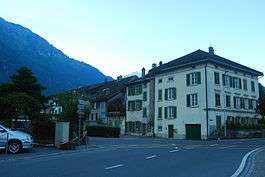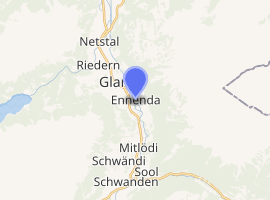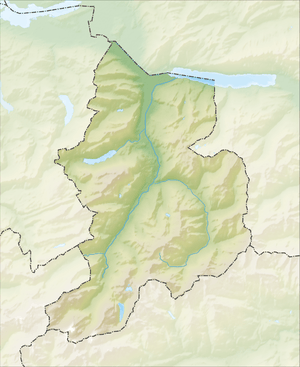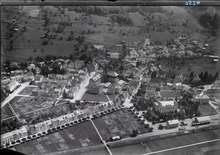Ennenda
Ennenda is a former municipality in the canton of Glarus in Switzerland. Effective from 1 January 2011, Ennenda is part of the municipality of Glarus.
Ennenda | |
|---|---|
 | |
 Coat of arms | |
Location of Ennenda 
| |
 Ennenda  Ennenda | |
| Coordinates: 47°02′N 9°05′E | |
| Country | Switzerland |
| Canton | Glarus |
| District | n.a. |
| Area | |
| • Total | 22.24 km2 (8.59 sq mi) |
| Elevation | 478 m (1,568 ft) |
| Population (2000)[1] | |
| • Total | 2,808 |
| • Density | 130/km2 (330/sq mi) |
| Postal code | 8755 |
| SFOS number | 1607 |
| Surrounded by | Filzbach, Glarus, Mitlödi, Mollis, Netstal, Obstalden, Sool |
| Website | www SFSO statistics |
History
Ennenda is first mentioned around 1303-07 as Obront-Ennant-A and Nydern-Ennant-A.[2]
During the 19th century, Ennenda became a busy manufacturing village in the local textile industry, and retains some attractive villas and housing from that period.[3]
Geography

Ennenda has an area, as of 2006, of 22.2 km2 (8.6 sq mi). Of this area, 35.5% is used for agricultural purposes, while 37.7% is forested. Of the rest of the land, 3.8% is settled (buildings or roads) and the remainder (23%) is non-productive (rivers, glaciers or mountains).[4]
Ennenda is located on the right side of the Linth river, across from Glarus at the foot of the Schilt mountain. It consists of the village of Ennenda and the hamlets of Sturmigen, Ennetbühls and the mountain settlement of Ennetberge.
Demographics
Ennenda had a population (as of 2010) of 2,684. As of 2007, 14.2% of the population was made up of foreign nationals.[5] Over the last 10 years the population has decreased at a rate of -9.6%. Most of the population (as of 2000) speaks German (87.6%), with Italian being second most common ( 3.7%) and Albanian being third ( 2.8%).[4]
In the 2007 federal election the most popular party was the SPS which received 58.8% of the vote. Most of the rest of the votes went to the SVP with 34.5% of the vote.[4]
The entire Swiss population is generally well educated. In Ennenda about 67.5% of the population (between age 25-64) have completed either non-mandatory upper secondary education or additional higher education (either University or a Fachhochschule).[4]
Ennenda has an unemployment rate of 1.55%. As of 2005, there were 80 people employed in the primary economic sector and about 34 businesses involved in this sector. 802 people are employed in the secondary sector and there are 33 businesses in this sector. 336 people are employed in the tertiary sector, with 51 businesses in this sector.[4]
The historical population is given in the following table:[2]
| year | population |
|---|---|
| 1554 | 204 |
| 1763 | 1,018 |
| 1850 | 2,313 |
| 1870 | 2,783 |
| 1900 | 2,494 |
| 1950 | 2,940 |
| 1960 | 3,076 |
| 2000 | 2,808 |
Transport
Ennenda railway station is on the Weesen to Linthal railway line. It is served by the Zürich S-Bahn service S25 between Linthal and Zurich, and by the St. Gallen S-Bahn service S6 between Rapperswil and Schwanden. Both services operate once per hour, combining to provide two trains per hour between Ziegelbrücke and Schwanden.[6][7][8]
References
- Historische Lexikon der Schweiz, Dictionnaire historique de la Suisse, Dizionario storico della Svizzera, Bern, 1998, Wikidata Q642074
- Ennenda in German, French and Italian in the online Historical Dictionary of Switzerland.
- Lambert, Anthony (2013). Switzerland Without A Car (5th ed.). Chalfont St. Peter: Bradt Travel Guides. p. 54. ISBN 978 1 84162 447 1.
- Swiss Federal Statistical Office Archived September 4, 2011, at the Wayback Machine accessed 10-Sep-2009
- Canton Glarus population growth Archived June 6, 2011, at the Wayback Machine (in German) accessed 9 September 2009
- "S-Bahn trains, buses and boats" (PDF). ZVV. Archived from the original (PDF) on 2014-07-28. Retrieved 2014-08-08.
- "S-Bahn St.Gallen Map" (PDF). S-Bahn. Archived from the original (PDF) on 2014-01-04. Retrieved 2014-08-08.
- "Ziegelbrücke–Linthal" (PDF). Bundesamt für Verkehr. Retrieved 2014-08-08.
| Wikimedia Commons has media related to Ennenda. |
External links
- Ennenda in German, French and Italian in the online Historical Dictionary of Switzerland.